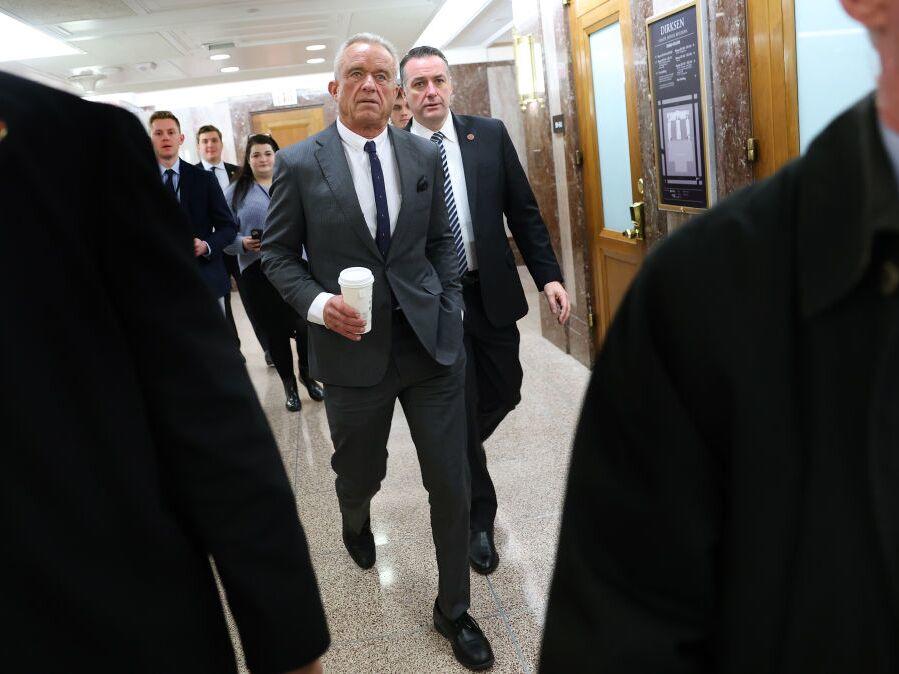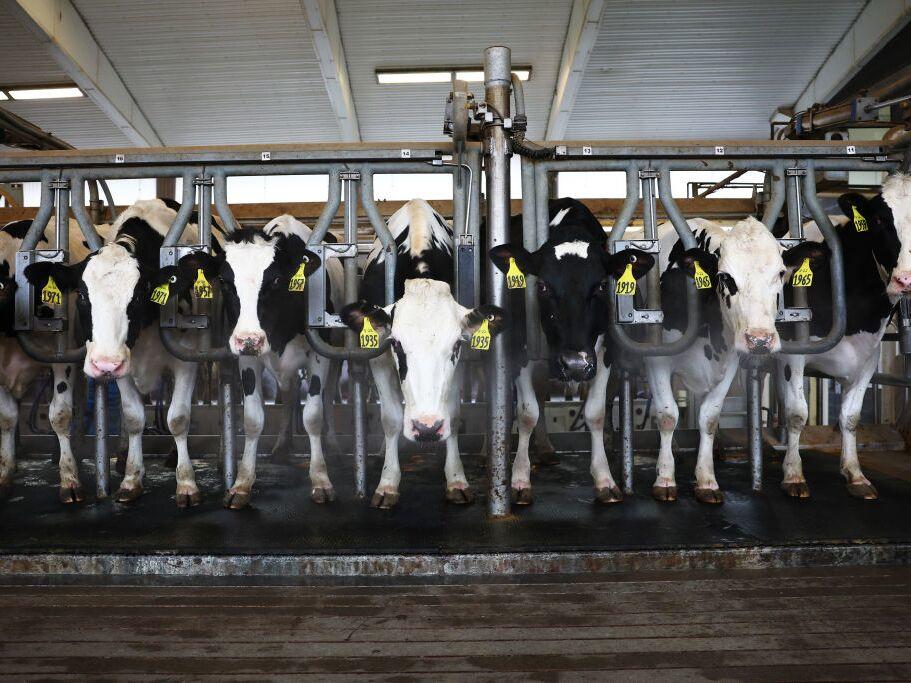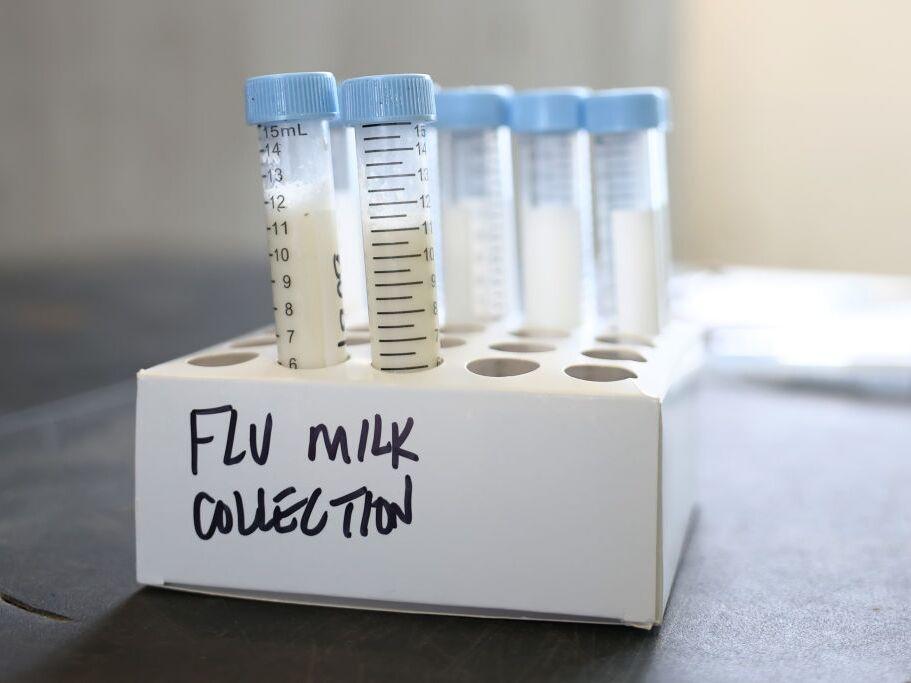Section Branding
Header Content
How would RFK Jr. handle bird flu? His record on vaccines has experts on edge
Primary Content
Bird flu's unprecedented spread among livestock and other mammals in the U.S. has raised fears that another pandemic could be in store.
The incoming Trump administration will have to prepare for this risk. As H5N1 spills into more people and animals, scientists warn it could evolve to better infect humans and become more dangerous.
Trump and his picks to helm federal health agencies have largely been silent on bird flu. The messaging so far — and the track record of those Trump has chosen to oversee a potential bird flu crisis — is "worrisome," says Dr. Andrew Pavia, professor of medicine at the University of Utah who's worked on influenza pandemic preparedness for more than two decades.
The transition team did not respond to NPR's request for comment on its plans.
Trump's choice to lead the Department of Health and Human Services, Robert F Kennedy Jr., has an extensive history of making inaccurate and misleading statements on vaccines and infectious diseases. He's a lawyer who for years led an advocacy group that is a major player in the anti-vaccine movement, promoting the long-debunked idea that vaccines lead to autism, among other false claims.
Kennedy denies spreading misinformation, though his criticism of vaccines is well known.
He's also made specific comments undermining trust in the bird flu vaccines. In an online post last summer, he claimed there's "no evidence" the licensed shots for the national stockpile will work and that they "appear dangerous."
And he suggested in another post that "someone" might bioengineer a dangerous form of the virus to profit off the vaccine.
Scientists who study the vaccines are deeply troubled by these statements.
"They are false, baseless and inaccurate," says Dr. Paul Offit, director of the Vaccine Education Center at the Children's Hospital of Philadelphia.
Kennedy has also discussed having the National Institutes of Health take a break from infectious disease research for eight years, and replacing hundreds of employees there.
Trump himself suggested last spring that he'd like to disband an office in the executive branch that handles pandemics.
If confirmed as health secretary, Kennedy would have broad powers. He could declare a public health emergency, control and direct funding, and influence key decisions at the Centers for Disease Control and Prevention, the Food and Drug Administration, and NIH, all of which are overseen by HHS.
"At every step, he can certainly play a role in hampering or being a barrier," says Syra Madad, director of the special pathogens program at NYC Health + Hospitals.
This could be of huge consequence for how prepared the country is to face an escalating crisis. Still, some scientists point to the first Trump administration's speedy work on a COVID-19 vaccine with Operation Warp Speed, and say they think that ultimately Kennedy would need to listen to Trump if he called for a similar effort.
"If the president tells him to do something, I would hope that would be the case," says Dr. Carlos del Rio, a professor of medicine at Emory University. "And let's be honest, there has been a lot of failure in the current response."
An urgent need to prepare
Bird flu currently doesn't pose an imminent threat to the American public — most of the 67 human cases since last April have only led to mild illness and were caused by direct exposure to infected animals.
But, scientists caution, things could change quickly.
"This is like some brush burning around your house," says Dr. Jesse Goodman, an infectious disease physician at Georgetown University and a former FDA official.
"You better pay attention because it could turn into something else."
To prepare for this threat, the U.S. must strengthen the pipeline of vaccines and treatments for bird flu, says Pavia. The Trump administration will need to help bolster supplies of the existing shots and support development of new ones.
"We are fooling ourselves that we have enough vaccine capacity and the ability to respond quickly," he warns.
Already under the Biden administration, scientists have criticized the federal government for the slow pace of its response.
"There's a lot of work that still needs to be done," says Jennifer Nuzzo, who directs the Pandemic Center at Brown University School of Public Health, adding that it's not like "handing over the keys to the car with the engine running."
Two weeks ago — more than nine months after the outbreak was first detected in cattle — health officials announced an investment of more than $300 million into pandemic readiness for bird flu. It wasn't until December that the federal government took key steps to track the spread in dairy cattle.
"We're flying blind just like we did during COVID-19," says Madad.
Alongside vaccines, public health experts have outlined a list of urgent tasks to battle bird flu, including: working with the industry to improve biosecurity measures and testing on farms; coordinating with state and local authorities on the ground; and planning for contingencies.
There are gaps in disease surveillance efforts on farms. And ultimately public health agencies have limited authority in this area, says Dr. Luciana Borio who served as the FDA's chief acting scientist from 2015 to 2017 and is now a fellow at the Council on Foreign Relations.
"That means we have to put even more effort into developing new vaccines and therapeutics more quickly," she says. "We can't just hope that this is going to go away."
Casting doubt on vaccines
Kennedy has grabbed headlines for promoting raw milk despite the public health warnings that it can harbor the bird flu virus. His views on vaccines could be even more consequential.
The Health Secretary could influence the rollout of a vaccine campaign and communication with the public. While it's rare to do so, he could even override FDA decisions on vaccine approvals and authorizations, and how the CDC comes up with recommendations, notes James Hodge, a law professor at Arizona State University.
"There's much he could do to disrupt vaccine programs in this country," says Offit. "I have little doubt that were he to pass his confirmation hearing, that's exactly what he'll do."
Last year, Kennedy took direct aim at bird flu vaccines in several posts on X.
He cited the pharmaceutical industry's financial interest in developing bird flu vaccines and he raised a conspiracy theory, suggesting that the government's work on bird flu vaccines may be in anticipation of a "lab-derived pandemic."
In June, he wrote: "With so much money on the table, is it conceivable that someone might deliberately release a bioengineered bird flu?"
Dr. Andrew Pekosz calls the idea "preposterous," and points out that developing vaccines ahead of time is exactly what needs to be done, in case a crisis emerges in the future.
"This is the planning and preparedness that public health officials and scientists do to be ready to respond," says Pekosz, a professor of microbiology at Johns Hopkins Bloomberg School of Public Health. "Those vaccines could be the primary way we protect our population from a potential H5N1 pandemic."
And contrary to Kennedy's statement raising a safety concern, the existing bird flu vaccines, as with the seasonal influenza shots, "have shown a safety record," he says. "They're not dangerous."
Those vaccines were developed to target older strains of bird flu and approved based on clinical data that looked at their safety and the immune response the vaccines elicited in participants.
The federal government is now having manufacturers update these shots to more closely target the strain of bird flu in circulation — similar to what's done with seasonal influenza every year — and is gathering more data based on new studies, which aren't yet published.
It's expected there will be about 10 million doses stockpiled by the spring.
Kennedy's claim there's "no evidence" the vaccines will work is misleading because their effectiveness can only be determined in human trials once a bird flu virus is actually spreading between people, says Michael Osterholm, director of the Center for Infectious Disease Research and Policy.
"There's no way we could know because we don't have the virus that's going to cause the next pandemic yet," he says.
However, health officials have noted that the newer vaccines, ordered by the federal government for the national stockpile, appear well-matched against the virus circulating in animals, according to lab research on the immune response they generate.
There is also separate data published last July showing the originally licensed vaccines induce antibodies "that likely would be protective" against the current strain, says Offit, though you can't know for sure without vaccine effectiveness studies.
If the virus changes significantly and begins spreading among people, it's entirely possible the vaccine will need to be updated further. That's why the federal government is not preemptively manufacturing hundreds of millions of doses right now, according to David Boucher, a senior official with the Administration for Strategic Preparedness and Response.
'A swift response'
In the event of a bird flu pandemic, Nuzzo says she expects Americans will "demand" vaccines, given just how deadly this virus might be.
"What I am worried about is whether any ideological opposition, or perhaps lack of understanding of science, gets in the way of a swift response," she says.
If the virus started spreading among humans, the country would not be able to manufacture all the needed shots in a rapid timeframe.
It would take about six months to churn out 150 million doses, and even longer if the virus had changed enough to warrant another update, says Boucher. And that's still not nearly enough to protect the entire U.S. population of more than 330 million people.
These concerns have prompted the federal government to invest in mRNA vaccine technology for bird flu as was done for COVID-19. These shots could be manufactured in a much faster timeframe.
Borio believes the government's work to accelerate development on new bird flu vaccines will continue under Trump, based on her experience working under the first Trump administration.
"No president or Congress wants to see people dying needlessly of an influenza pandemic," she says.
For his part, Trump's pick to lead the FDA, Dr. Marty Makary, has pushed back on concerns that Kennedy's stance on vaccines should disqualify him from being secretary.
But this transition period is a delicate moment, when the country could be caught off guard if the situation suddenly changes, says Goodman, who recommends the Biden administration share its pandemic playbook so incoming officials can game out different pandemic scenarios and assess readiness. He also cautions that Trump's team needs to preserve the federal workforce, including the career scientists, who have the knowledge on bird flu and pandemics.
"You want to keep the best people, not scare them away," with "extreme rhetoric," he says.
As Trump brings in new people, Pavia hopes he taps those with bird flu expertise, saying there are plenty of "conservative choices," with backgrounds in biodefense and the military. After all, it was President George W. Bush who emphasized the threat of bird flu 20 years ago.
"What you can't do is bring in novices. You can't bring in people who don't have any experience with the diseases or with the complexities of a response," he says. "Mother Nature doesn't care what your politics or your policies are."
Additional reporting by Rob Stein. Edited by Carmel Wroth.



